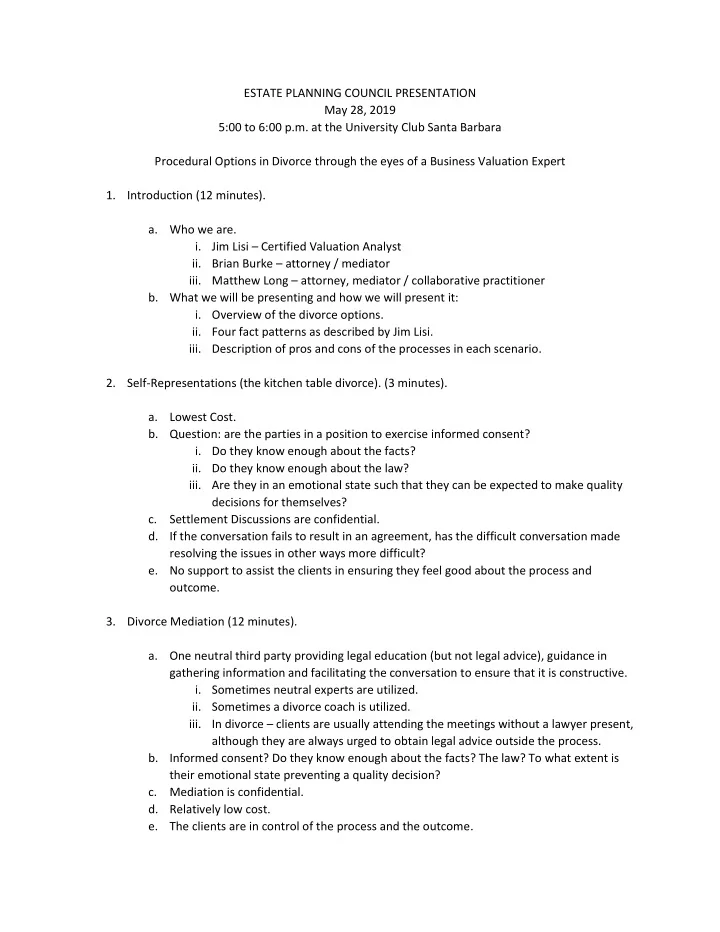

ESTATE PLANNING COUNCIL PRESENTATION May 28, 2019 5:00 to 6:00 p.m. at the University Club Santa Barbara Procedural Options in Divorce through the eyes of a Business Valuation Expert 1. Introduction (12 minutes). a. Who we are. i. Jim Lisi – Certified Valuation Analyst ii. Brian Burke – attorney / mediator iii. Matthew Long – attorney, mediator / collaborative practitioner b. What we will be presenting and how we will present it: i. Overview of the divorce options. ii. Four fact patterns as described by Jim Lisi. iii. Description of pros and cons of the processes in each scenario. 2. Self-Representations (the kitchen table divorce). (3 minutes). a. Lowest Cost. b. Question: are the parties in a position to exercise informed consent? i. Do they know enough about the facts? ii. Do they know enough about the law? iii. Are they in an emotional state such that they can be expected to make quality decisions for themselves? c. Settlement Discussions are confidential. d. If the conversation fails to result in an agreement, has the difficult conversation made resolving the issues in other ways more difficult? e. No support to assist the clients in ensuring they feel good about the process and outcome. 3. Divorce Mediation (12 minutes). a. One neutral third party providing legal education (but not legal advice), guidance in gathering information and facilitating the conversation to ensure that it is constructive. i. Sometimes neutral experts are utilized. ii. Sometimes a divorce coach is utilized. iii. In divorce – clients are usually attending the meetings without a lawyer present, although they are always urged to obtain legal advice outside the process. b. Informed consent? Do they know enough about the facts? The law? To what extent is their emotional state preventing a quality decision? c. Mediation is confidential. d. Relatively low cost. e. The clients are in control of the process and the outcome.
f. No guarantee of resolution, although the statistics are generally good. g. Trained and skilled mediator can offer support to assist the clients in ensuring they feel good about the process and outcome. 4. Collaborative Divorce (12 minutes). a. A Team Approach i. Each party has an attorney (trained in mediation) who is prohibited from representing the clients should the matter go to court. ii. One or two divorce coaches addressing the emotional and communication challenges (may not be asked to testify). iii. One neutral financial professional addressing the financial fact gathering, analysis, and development of settlement options (may not be asked to testify). iv. One neutral child specialist if appropriate. (may not be asked to testfy). b. Informed consent? Do they know enough about the facts? The law? To what extent is their emotional state preventing a quality decision? c. A confidential process. d. Low cost relative to litigation, but not “low cost.” i. Insuring the professional most qualified to address an issue is the one addressing that issue. ii. Most non-attorney professionals are operating at a lower hourly rate than attorneys. e. Professionals are the “experts” on process, but the clients ultimately c ontrol both the process and the outcome. f. No guarantee of resolution, although the statistics are generally good. g. Maximum support in assisting the clients in ensuring they feel good about the process and outcome. 5. The Litigated (court centered) Divorce (13 minutes). a. The court controls the process (with indirect control from attorneys, but the clients have no control). b. If no agreements are reached pretrial, the court controls the outcome. c. A public, non-confidential, process. d. If there is a settlement, informed consent? i. Up to the attorneys to decide how important it is that the client know the law before deciding; ii. Maximum encouragement to obtain evidence (sometimes at great expense), up to the attorneys to decide how important it is that the client know the facts before deciding; iii. Very little patience or skill utilized in the process to address the client’s emotional state when deciding. e. Very hit or miss if attorneys are skilled enough to assist the clients in ensuring they feel good about the process and outcome – generally perceived as irrelevant to this process.
f. Resolution is “guaranteed,” there will be a decision (although we’ve all heard the stories about the cases that go on for years). g. Never “low cost,” but with effort on the part of the attorneys a settlement can be reached at a reasonable fee. Clients, however, usually don’t have enough information nor emotional “bandwidth” to ensure this. By far the most expensive if the case proceeds to trial. 6. Question and answer period (10 minutes).
Recommend
More recommend